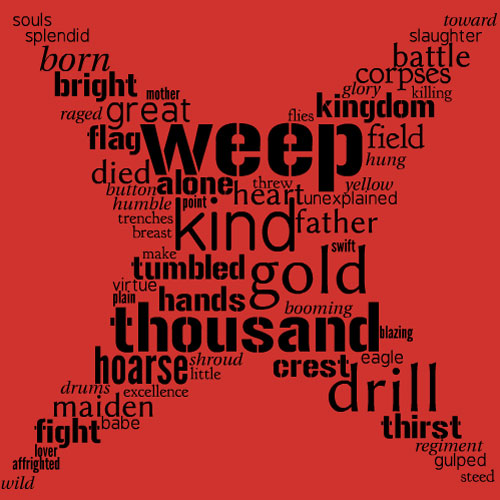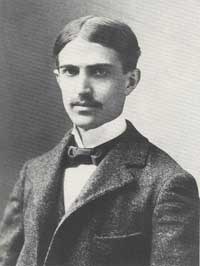Test Your Understanding
Review the artwork below. It contains words from the poem “Do not weep, maiden, for war is kind.”

For your final activity, let’s see if we can put everything together we’ve learned so far. Read the poem “Do not weep, maiden, for war is kind” by Stephen Crane. As you read, use your notes, to write down the words from the passage that create imagery. Then answer the questions below.

Source: Engraving of author Stephen Crane, Wikimedia Commons
Do not weep, maiden, for war is kind.
Because your lover threw wild hands toward the sky
And the affrighted steed ran on alone,
Do not weep.
War is kind.
Hoarse, booming drums of the regiment,
Little souls who thirst for fight,
These men were born to drill and die.
The unexplained glory flies above them,
Great is the battle-god, great, and his kingdom—
A field where a thousand corpses lie.
Do not weep, babe, for war is kind.
Because your father tumbled in the yellow trenches,
Raged at his breast, gulped and died,
Do not weep.
War is kind.
Swift blazing flag of the regiment,
Eagle with crest of red and gold,
These men were born to drill and die.
Point for them the virtue of slaughter,
Make plain to them the excellence of killing
And a field where a thousand corpses lie.
Mother, whose heart hung humble as a button
On the bright splendid shroud of your son,
Do not weep.
War is kind.
Answer these six questions about imagery in the poem and its effect on you, the reader.
- Why is the use of imagery important when the poet describes the drums?
- In the second stanza, you have a description of the “little souls.” What do you think the poet means by describing these soldiers as “little souls”? Hint: Think about how Crane continues to describe these soldiers in the rest of the stanza.
- What does the use of the color “yellow” suggests about the trenches? Hint: Can you think in concrete and abstract ways about the word “yellow”?
- Why are the colors “red” and “gold” important when the poet describes the flag the regiment is carrying?
- Explain the image of the “Mother, whose heart hung humble as a button.”
- Again, think in abstract ways about the unexpected use of the words “bright” and “splendid” to describe the shroud of the mother’s son. Explain this image.
Use your notes to write your response. When you're finished, check your understanding.
Sample Response:
The word “hoarse” suggests a negative image. Our voice gets hoarse from overuse. The drums have been booming a long time. “Booming” suggests guns or bombs.
CloseUse your notes to write your response. When you're finished, check your understanding.
Sample Response:
If you read the entire stanza, Crane seems to suggest that “little” means not “whole.” The men only live to fight.
CloseUse your notes to write your response. When you're finished, check your understanding.
Sample Response:
The concrete use of the word would mean the yellow of the dirt in the trenches, while the abstract use of yellow would mean “cowardly” or “afraid.”
CloseUse your notes to write your response. When you're finished, check your understanding.
Sample Response:
Red and gold are royal colors and might represent bravery and nobility.
CloseUse your notes to write your response. When you're finished, check your understanding.
Sample Response:
A button is a lowly thing. There is a sense through the entire poem that the loved ones are left behind and that they are fairly powerless as the men ride into battle.
CloseUse your notes to write your response. When you're finished, check your understanding.
Sample Response:
These words should cause us to wonder what the poet is up to. He says that war is kind, but then gives us lots of reason to doubt that statement, such as saying that the mother’s son is dead, the lover has died, and the father has died as well. Therefore, we should begin to doubt the truth of the poem’s title.
Close